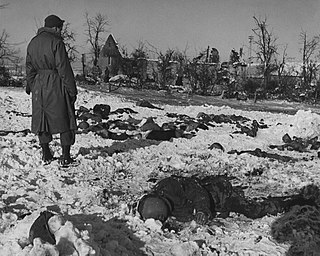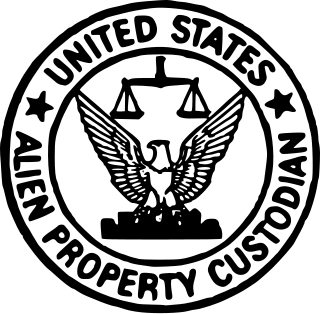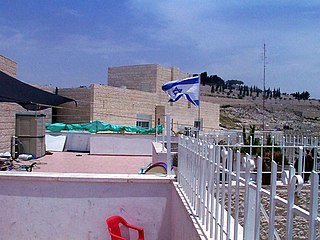
A war crime is a violation of the laws of war that gives rise to individual criminal responsibility for actions by combatants in action, such as intentionally killing civilians or intentionally killing prisoners of war, torture, taking hostages, unnecessarily destroying civilian property, deception by perfidy, wartime sexual violence, pillaging, and for any individual that is part of the command structure who orders any attempt to committing mass killings including genocide or ethnic cleansing, the granting of no quarter despite surrender, the conscription of children in the military and flouting the legal distinctions of proportionality and military necessity.

An unlawful combatant, illegal combatant or unprivileged combatant/belligerent is a person who directly engages in armed conflict in violation of the laws of war and therefore is claimed not to be protected by the Geneva Conventions. The International Committee of the Red Cross points out that the terms "unlawful combatant", "illegal combatant" or "unprivileged combatant/belligerent" are not defined in any international agreements. While the concept of an unlawful combatant is included in the Third Geneva Convention, the phrase itself does not appear in the document. Article 4 of the Third Geneva Convention does describe categories under which a person may be entitled to prisoner of war status. There are other international treaties that deny lawful combatant status for mercenaries and children.

In international law, extraterritoriality or exterritoriality is the state of being exempted from the jurisdiction of local law, usually as the result of diplomatic negotiations.

The Trading with the Enemy Act (TWEA) of 1917 is a United States federal law, enacted on October 6, 1917, in response to the United States declaration of war on Germany on April 6, 1917. It continues to give the President of the United States the power to oversee or restrict any and all trade between the United States and its enemies in times of war. TWEA was amended in 1933 by the Emergency Banking Act to extend the president’s authority also in peace time. It was amended again in 1977 by the International Emergency Economic Powers Act (IEEPA) to restrict again the application of TWEA only to times of war, while the IEEPA was intended to be used in peace time.
Extraterritorial jurisdiction (ETJ) is the legal ability of a government to exercise authority beyond its normal boundaries.

From 1942 to 1949, Canada forcibly relocated and incarcerated over 22,000 Japanese Canadians—comprising over 90% of the total Japanese Canadian population—from British Columbia in the name of "national security". The majority were Canadian citizens by birth and were targeted based on their ancestry. This decision followed the events of the Japanese Empire's war in the Pacific against the Western Allies, such as the invasion of Hong Kong, the attack on Pearl Harbor in Hawaii, and the Fall of Singapore which led to the Canadian declaration of war on Japan during World War II. Similar to the actions taken against Japanese Americans in neighbouring United States, this forced relocation subjected many Japanese Canadians to government-enforced curfews and interrogations, job and property losses, and forced repatriation to Japan.
Johnson v. Eisentrager, 339 U.S. 763 (1950), was a major decision of the US Supreme Court, where it decided that US courts had no jurisdiction over German war criminals held in a US-administered prison in Germany. The prisoners had at no time been on American sovereign territory.

The Office of Alien Property Custodian was an office within the government of the United States during World War I and again during World War II, serving as a custodian to property that belonged to US enemies. The office was created in 1917 by Executive Order 2729-A under the Trading with the Enemy Act of 1917 (TWEA) in order to "assume control and dispose of enemy-owned property in the United States and its possessions."
Land and property laws in Israel are the property law component of Israeli law, providing the legal framework for the ownership and other in rem rights towards all forms of property in Israel, including real estate (land) and movable property. Besides tangible property, economic rights are also usually treated as property, in addition to being covered by the law of obligations.

Sheikh Jarrah is a predominantly Palestinian neighborhood in East Jerusalem, two kilometres north of the Old City, on the road to Mount Scopus. It received its name from the 13th-century tomb of Hussam al-Din al-Jarrahi, a physician of Saladin, located within its vicinity. The modern neighborhood was founded in 1865 and gradually became a residential center of Jerusalem's Muslim elite, particularly the al-Husayni family. After the 1948 Arab–Israeli War, it became under Jordanian-held East Jerusalem, bordering the no-man's land area with Israeli-held West Jerusalem until Israel occupied the neighborhood in the 1967 Six-Day War. Most of its present Palestinian population is said to come from refugees expelled from Jerusalem's Talbiya neighbourhood in 1948.

Shimon HaTzadik is an Israeli settlement in East Jerusalem, established around the Tomb of Simeon the Just, after whom it was named. The neighborhood was established in 1890 and abandoned during the 1948 Palestine war. At the beginning of the new millennium after a long legal battle, Jewish residents settled down in the area near the Arab neighborhood of Sheikh Jarrah.
Israeli settlements in the Israeli-occupied Palestinian territories of the West Bank and the Gaza Strip, as well as in the Syrian Golan Heights, are illegal under international law. These settlements are in violation of Article 49 of the Fourth Geneva Convention, and in breach of international declarations. In a 2024 ruling by the International Court of Justice (ICJ) relating to the Palestinian territories, the court reaffirmed the illegality of the settlements and called on Israel to end its occupation, cease its settlement activity, and evacuate all its settlers.

The Trading with the Enemy Act 1914 was an Act of the Parliament of the United Kingdom that prescribed an offence of conducting business with any person of "enemy character". It was enacted soon after the United Kingdom became involved in World War I.
Trading with the Enemy Act is a stock short title used for legislation in the United Kingdom and the United States relating to trading with the enemy.

Ma'ale HaZeitim is a Jewish Israeli settlement in East Jerusalem, located on the Mount of Olives, near the Palestinian neighborhood of Ras al-Amud. In 2010, its inhabitants numbered some 250 people belonging to 50 families. In 2011 it was projected to house 110 families and eventually merge with the new settlement of Ma'alot David, designed to replace an old police station across the street from Ma'ale HaZeitim, which would make them become the largest Jewish settlement in East Jerusalem. By 2016 Ma'ale HaZeitim was housing about 90 families and the adjacent project, now called Ma’alot David, had 23 housing units. In 2017, construction started on a community center, which will include two synagogues, a kindergarten, a higher learning institution, a library and an event hall, all overlooking the Temple Mount.
In Canada, the Office of the Custodian of Enemy Property, attached to the Secretary of State for Canada, was established in 1916 and existed until 1985, dealing with the property of Canada's enemies in both World Wars as well as with the seized property of Japanese Canadians.

Present absentees are Arab internally displaced persons (IDPs) who fled or were expelled from their homes in Mandatory Palestine during the 1947–1949 Palestine war but remained within the area that became the state of Israel.
Land expropriation in the West Bank refers to the practices employed by the State of Israel to take over Palestinian land in the occupied West Bank. From 1969 to 2019 Israel had issued over 1,150 military seizure orders alone to that purpose.

Palestinian displacement in East Jerusalem is the transfer of Palestinian residents from the city due to Israeli policies aimed at an Israeli-Jewish demographic majority. Many Palestinian families in East Jerusalem have been affected by "forced relocation processes or been involved in lengthy legal procedures to revoke an eviction order." According to the United Nations Office for the Coordination of Humanitarian Affairs (OCHA), between a third to a half of East Jerusalem's houses do not have permits, potentially placing over 100,000 Palestinian residents of the city at risk of forced displacement and forcible transfer as a result of demolitions.

Yossi Katz is professor emeritus at the Bar-Ilan University, an expert in historical geography. His main research interests include Jewish settlement in towns and villages in the new era, settlemental, economic, political and cultural aspects of the history of Palestine and Israel, including Zionism, land laws, kibbutzim, and communal settlements in Canada.












